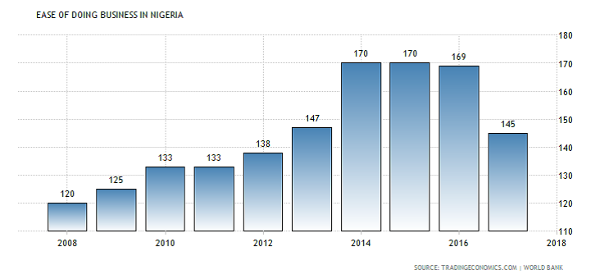
Amid the prevailing excruciating business
environment in the country, the manufacturing sector registered improved
performance in 2018, in terms of capacity utilisation, production and
investments, the annual report of the Manufacturing Association of Nigeria
(MAN), which was released last week revealed.
The sector achieved a small growth of 2.1 percent
in the year under review, representing 2.22 percent increase from -0.12 per
cent achieved in 2017, the report added.
According to the report, the growth was positive
across all quarters of 2018. In the first quarter, the sector registered 3.4
per cent just as it achieved 0.7 per cent in the second quarter, while the
results in the third and fourth quarters were 1.9 per cent and 2.4 per cent
respectively.
Although, the report which was made available to
reporters at the weekend showed that the performance presented a better scenario than what was obtained
in 2017, not all the groups within the
sector registered significant growth as most of the challenges that have been
hobbling the manufacturing industry sub-sector in the country have
remained.
The report showed that capacity utilisation
increased to 61 per cent in the second half of 2018, representing an increase
of 1.76 per cent point from 59.24 per cent in 2017. Similarly, it rose by 6.5 percentage point
growth when compared with the 54.5 per cent achieved in the first half of 2018.
On the whole, according to the report, capacity
utilisation in the sector averaged 57.8 per cent in 2018, representing an
increase of 0.66 percentage point from 57.14 per cent average achieved in 2017,
a performance, which was attributed to “the general improvement in the macro-economy
and the sustained stability in the forex market.”
Similarly, the report stated that the estimated
cumulative manufacturing investment from 2013 to 2018 reached N4.55 trillion
based on the date based on the study conducted by MAN over the period.
Hence, in 2018, manufacturing investment stood at
N247.08 billion, representing an increase of N70.39 billion or 39.8 per cent
achieved in the second half of 2017. It however declined by N58.48 billion
(19.1 per cent) when compared with N305.56 billion in the first half of 2018,
the report noted.
On annual basis, manufacturing investment stood at
N552.64 billion in 2018 as against N505.97 billion achieved in 2017.
The report revealed that among the manufacturing
subheads, Plant and Machinery ranked first with investment worth N72.98 billion
followed by Land and Building which
generated investment worth N56.5 billion just as Asset Under Construction was N54.32 billion
and Motor (vehicle) was N43.23 billion.

However, according MAN report, inventory
of unsold manufactured goods remained high, and stood at N225.89 billion
in the second half of 2018, representing an increase of N64.36 billion (or 39.8 per cent ) and N76.66 billion (or 51. 14
per cent ) from N161.53 billion
of 2017, and the first half of
2018. On aggregate, it totaled N375.42 billion in 2018 and N321.12 billion in
2017.
The report attributed the high inventory of unsold
finished manufactured goods in the period to weak demand fueled by lack of
patronage, smuggling, and counterfeiting of Nigerian manufactured products.
Weak infrastructure (especially electricity) and rising cost of funds also
affected manufacturing activities during the year under review. The president
of the association had in his speech at the just concluded 47th Annual General
Meeting noted that “the manufacturing sector is beset with poor electricity
supply and high cost of energy,” adding that “the cost of self-generated power is
as high as N93.1 billion (2018).”
For the economy and the manufacturing sector to
experience significant improvement in the years ahead, MAN said it was
imperative that the “various challenges limiting manufacturing performance and
growth are adequately addressed taking into consideration,” infrastructure,
funding and high interest rate, level of local patronage, development of local
raw materials and tax issues as well as export incentives and trade
malpractices.
On infrastructure, the association urged the
government to resuscitate domestic refining of crude oil in the country;
operationalise the Independent Power Producers (IPP) initiative; rehabilitate
existing key road network across the country and show more commitment to the
development of the rail system.
No comments:
Post a Comment